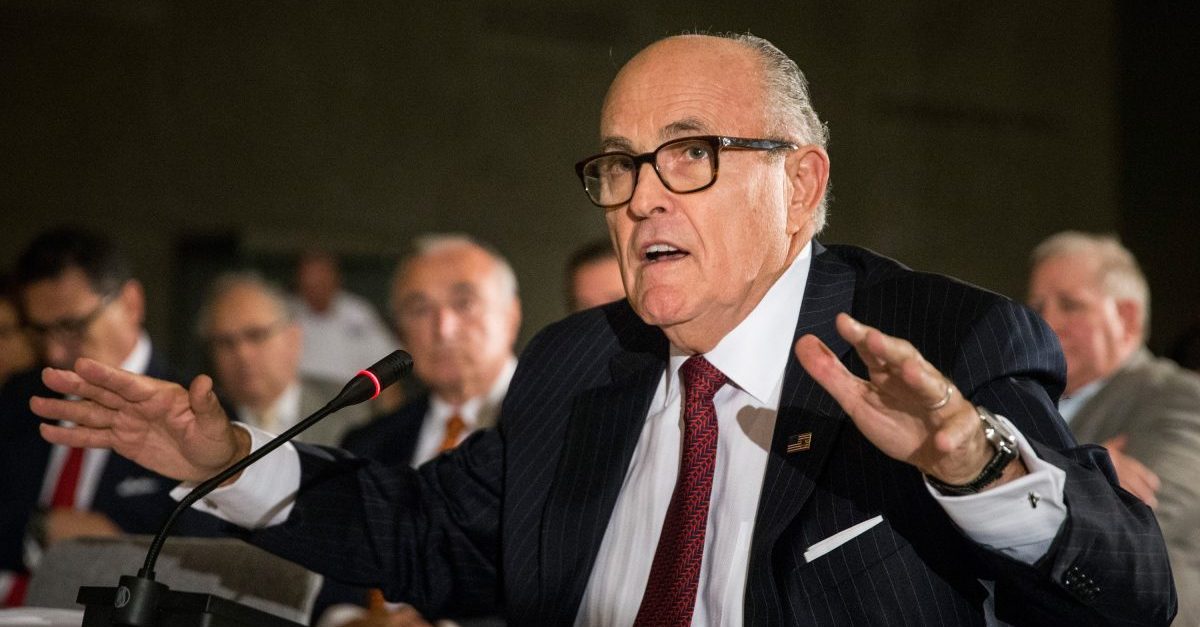
Michael Mukasey, a former attorney general whose son is currently advising President Donald Trump on impeachment matters, doesn’t think Congress should have been able to subpoena Rudy Giuliani’s phone records. Giuliani, of course, is also Trump’s attorney.
“There does not appear to be any basis to believe that a congressional committee is authorized to subpoena telephone records directly from a provider—as opposed to an individual,” the elder Mukasey told Kimberley Strassel for a Wall Street Journal column published Thursday evening.
The White House, congressional Republicans and their media allies have been throwing an extended fit about the House Intelligence Committee’s subpoena of Giuliani’s phone records. Strassel’s column itself is a meandering font of invective seemingly dedicated to moving those complaints forward and into yet another news cycle.
Mukasey also argues there’s a legal problem with House Intelligence Committee Chairman Rep. Adam Schiff (D-Calif.) obtaining those call logs and that this alleged problem is “compounded” because it “raises questions of work-product and attorney-client privilege.”
That’s actually not true at all.
The attorney-client privilege protects certain confidential communications between a lawyer and their client–or a prospective client–if those communications are primarily initiated to obtain or to give legal advice. The basic fact that a person spoke with a lawyer is not protected–courts do not recognize such a privilege.
In Giuliani and Trump’s case, the call logs themselves don’t reveal the contents of their communications and therefore don’t rise to the level of what would be protected under the privilege. There’s no privilege question raised by Schiff’s efforts whatsoever.
The attorney work-product exception is similarly inapplicable here. This privilege only protects the disclosure or discovery of documents prepared by an attorney in the course of litigation. Giuliani’s call logs are not documents he prepared and there’s no litigation at stake here.
It’s worth noting that Giuliani and Mukasey have been friends for decades and have a professional relationship as well–the duo attempted to work on the controversial Reza Zarrab case together, for old time’s sake, but were shut down by the judge and New York City prosecutors due to a sweeping collection of conflicting interests.
The New York Times offers the following anecdote of times past:
The two men loved pranks. When Mr. Giuliani tried to join Mr. Mukasey’s firm, Patterson Belknap Webb & Tyler, in the late 1970s, Mr. Mukasey faxed him a phony letter that appeared to be to one of the senior partners, listing the reasons Mr. Giuliani was unprepared for the job, according to an interview that one partner, Harold R. Tyler Jr., gave to Newsday in 1995. The letter spurred Mr. Giuliani to protest to Mr. Tyler, a mentor of his, about his qualifications and helped persuade him to take the job.
After invoking Mukasey’s semi-cautious and lawyerly musings about potential privilege issues, Strassel goes much further.
“Whatever his role in the Ukraine affair, Mr. Giuliani remains the president’s personal lawyer,” the columnist writes. “Law enforcement must present a judge with powerful evidence to get permission to vitiate attorney-client privilege. Mr. Schiff ignored all that, and made himself privy to data that could expose the legal strategies of the man he is investigating.”
It’s currently unclear exactly what Giuliani-related data the House Intelligence Committee has in its hands. But, again, the call logs themselves don’t fall under the privilege so Strassel’s preceding lines, while containing a few true statements, overall have nothing to do with what impeachment investigators have released.
And, as Law&Crime has previously reported, the congressional subpoena authority is not hamstrung like law enforcement. Rather, Congress acts more like a private plaintiff in a lawsuit—where subpoenas for information are routinely enforced. Not to put too fine a point on it, but: Congress is not law enforcement.
Also in service of her goal to paint Schiff as a “fanatic,” Strassel quotes conservative attorney David Rivkind’s unorthodox views.
The column continues:
“The subpoenas aren’t related to legitimate congressional oversight,” says constitutional lawyer David Rivkin. Because there’s “no conceivable legislative purpose to obtaining these call logs and publicly disclosing this information, Mr. Schiff would not be able to benefit from the Speech and Debate Clause immunity that otherwise protects members of Congress from civil and criminal liability.”
Rivkind’s view here is highly controversial. The Constitution’s Speech or Debate Clause is essentially a Cadillac version of hyper-protected speech that not only extends to members of Congress–but also to congressional aides speaking on behalf of their bosses.
The clause famously protected then-Senator Mike Gravel (D-Alaska) and his aide, Leonard Rodberg, who read the Top Secret Pentagon Papers into the congressional record.
Aside from understating the thorough–and absolute–privilege granted by the Speech or Debate Clause, Rivkind goes on to suggest several private lawsuits that he thinks could potentially be filed against Schiff.
The American civil court system is famously amenable to allowing suits against people–but there’s no indication such suits would stand a chance or even be allowed by a judge.
[image via Andrew Burton/Getty Images]
Have a tip we should know? [email protected]